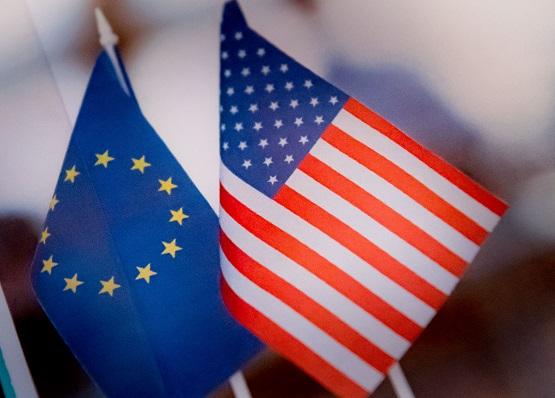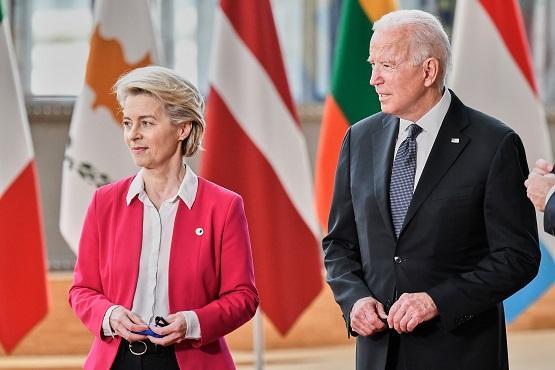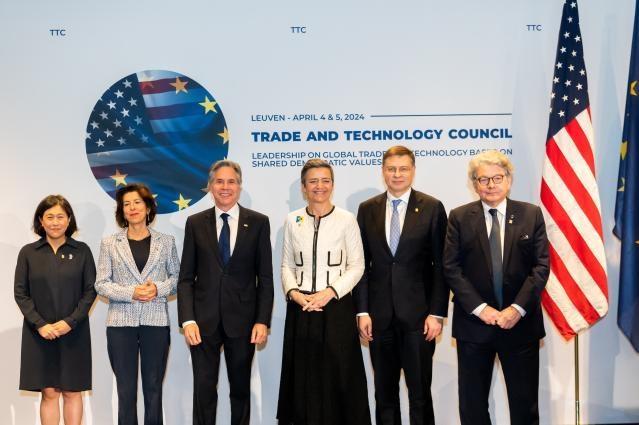EU-US Trade and Technology Council
The European Union and the United States are partners strongly committed to driving digital transformation and cooperating on new technologies based on their shared democratic values, including respect for human rights.
The EU-US Trade and Technology Council serves as a forum for the United States and European Union to coordinate approaches to key global trade, economic, and technology issues and to deepen transatlantic trade and economic relations based on these shared values. It was established during the EU-US Summit on 15 June 2021 in Brussels.

Objectives of the partnership
Through the Council, the EU and the US are working together to:
- ensure that trade and technology serve our societies and economies, while upholding our common values
- strengthen our technological and industrial leadership
- expand bilateral trade and investment

Sixth Ministerial Meeting (4-5 April 2024)

The EU and US met in Leuven (Belgium) on 4-5 April 2024 for the sixth ministerial-level meeting of the Trade and Technology Council. They agreed on:
1. Advancing transatlantic cooperation on AI, 6G, critical and emerging technologies
- Artificial intelligence: reaffirmed their commitment to a risk-based approach to AI and support for safe and trustworthy AI technologies, which will help find solutions to global challenges, and announced a new Dialogue between the EU AI Office and the US AI Safety Institute
- 6G: adopted a common 6G vision setting out guiding principles for this technology and signed an administrative arrangement for research collaboration
- Semiconductors: extended for three years the two administrative arrangements that enable building resilient semiconductor supply chains
- Emerging technology standards: released a Digital Identity Mapping Report to identify opportunities for transatlantic interoperability and cross-border use of digital identities
2. Promoting easier, more sustainable and more secure trade on the transatlantic market
- Sustainable trade: reaffirmed the importance of the Transatlantic Initiative on Sustainable Trade and agreed to publish a Joint Catalogue of Best Practices on Green Public Procurement, to accelerate the deployment of publicly financed sustainability projects
- Easier trade: agreed to facilitate digital tools in trade, coordinated and aligned the technical standards for e-invoicing systems
- Clean energy: welcomed the publication of recommendations for greater transatlantic compatibility in e-vehicle charging infrastructure
- Critical minerals: advanced negotiations towards a Critical Minerals Agreement to strengthen EU-US supply chains in critical minerals for electric vehicles batteries, and welcomed the launch of the Minerals Security Partnership Forum
- Economic security: reaffirmed their shared concerns about the challenges posed by economic coercion and non-market practices employed by third countries, resolved to continue their efforts to de-risk and diversify their trade and investment relations, and to continue work on facilitating secure high-technology trade
3. Defending human rights and values in a changing geopolitical digital environment
- Gender-based violence: developed a set of joint principles on gender-based violence on online platforms
- Democracy and human rights: reaffirmed their support to democracies around the world and to combatting foreign information manipulation and interference, and published joint Recommended Actions for Online Platforms on Protecting Human Rights Defenders Online
- Data: committed to facilitating data access from online platforms and published a report on mechanisms for researcher access to such data
Areas of cooperation
At its inaugural meeting on 29 September 2021 in Pittsburgh, USA, the Council agreed on five key areas of cooperation:
- Export controls
- Foreign direct investment screening
- Secure supply chains (especially regarding semiconductors)
- Technology standards, including cooperation on Artificial Intelligence
- Global trade challenges
Ways of working
The Council is comprised of working groups led or co-led by relevant departments, services or agencies, to operationalise the political decisions and coordinate the technical work.
The Council has initially included ten working groups:
| 1. Technology standards cooperation |
| 2. Climate and clean tech |
| 3. Secure supply chains |
| 4. ICTs security and competitiveness |
| 5. Data governance and technology platform |
| 6. Misuse of technology threatening security & human rights |
| 7. Export controls cooperation |
| 8. Investment screening cooperation |
| 9. Promoting SME access to and use of digital technologies |
| 10. Global trade challenges |
Background
European Commission President Ursula von der Leyen and US President Joe Biden launched the EU-US Trade and Technology Council at the EU-US Summit in Brussels on June 15, 2021.
The Council meets periodically at political level to steer the cooperation, co-chaired by European Commission Executive Vice-President and EU Competition Commissioner, Margrethe Vestager, and European Commission Executive Vice-President and EU Trade Commissioner, Valdis Dombrovskis, on the EU side; and US Secretary of State, Antony Blinken, US Secretary of Commerce, Gina Raimondo, and US Trade Representative, Katherine Tai, on the US side.
In parallel, the EU and the US have set up a Joint Technology Competition Policy Dialogue that will focus on developing common approaches and strengthening the cooperation on competition policy and enforcement in the tech sectors.




